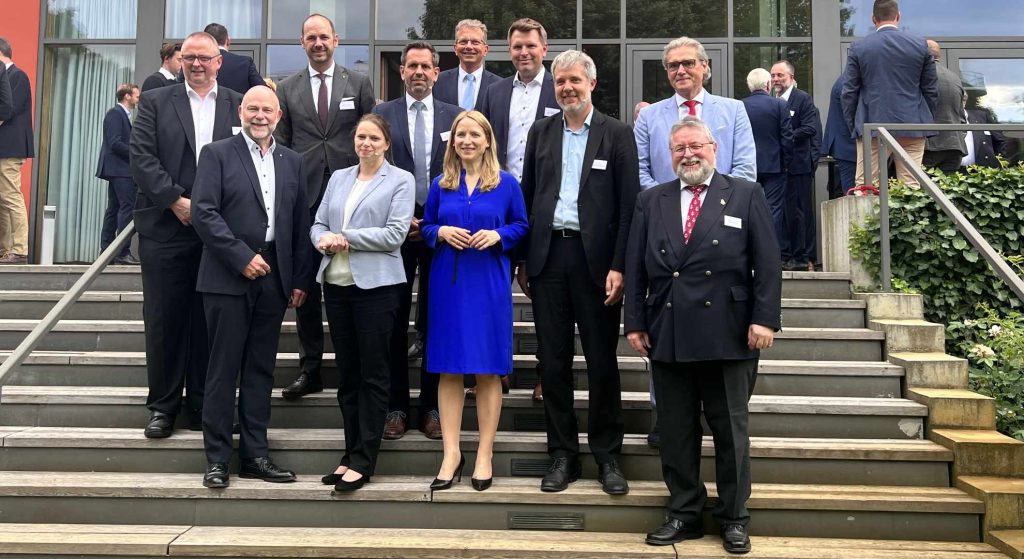Without well-developed and functional ports on Germany's coasts, the success of the energy turnaround, the security of energy supplies and the stability of supply chains are at risk. The federal government must give special support to ports as a nationally important infrastructure in a national port strategy.
The senators and ministers responsible for Germany's North Sea ports discussed the issue with Dieter Janecek, the federal government's maritime coordinator, at Bremen's state representation in Berlin on Thursday.
Bremen's Senator for Ports, Dr. Claudia Schilling:
"We have an expectation that is as clear as it is simple: we want the federal government to make a clear commitment to seaports. I am confident that with the National Ports Strategy we will have a framework to implement investment projects much faster. Because that is what we urgently need: more speed. And what we need just as much is more money for the ports. There has to be a zero behind the current amount of 38 million euros."
Hamburg's Senator for Economic Affairs Dr. Melanie Leonhard:
"Germany as an export nation needs a functioning port infrastructure. For decades, the ports have been committed to this to a considerable extent. However, they cannot finance this important national infrastructure single-handedly from municipal budgets, especially since the ports are increasingly confronted with new and expanded tasks such as the handling of energy sources. It is imperative that the federal government prioritize its own power construction tasks, such as maintaining federal waterways, and get involved in upgrading coastal infrastructure such as quaysides or railroads just as it does in other inland construction projects."
Niedersachsens Economics Minister Olaf Lies:
"We need genuine, northern German port cooperation. I am passionately campaigning for this. To ensure that the north German ports can continue to fulfill their central function as hubs for the national and international exchange of goods and freight distribution centers in the future, policymakers must support the maritime industry and the ports with an active and forward-looking port policy. To this end, it is urgently necessary that we finally tackle the topic of port cooperation in a serious and future-oriented manner within the framework of the National Ports Strategy and through more in-depth use of the German Ports platform, and ensure that added value is developed from cooperation between the northern German ports. More digitization is part of the solution. In this way, we can strengthen the international competitiveness of our ports and exploit the promising development potential of the individual locations, which I see not least in their function as future hubs in Germany's energy supply sector."
The discussion reflected the dynamics that can currently be observed in all major northern German port locations. For example, the ports of Lower Saxony have assumed a central role in the security of Germany's energy supply in a very short time. With a new EnergyPort to be developed in Bremerhaven, Bremen wants to create infrastructural conditions so that the forthcoming offshore expansion can also be implemented. In a new port development plan, Hamburg has also placed a strong focus on the area of the energy turnaround through the creation of a "Sustainable Energy Hub", but at the same time is also focusing on further qualitative development of the port.
The states agreed that these are tasks of national importance and that the federal government must therefore increase its financial commitment many times over. Currently, the federal government makes an annual contribution of 38 million for investments in ports for all German port locations. In the coming years, investments in maintaining the existing quay infrastructure alone will amount to a high three-digit million sum. Added to this are large sums invested in new port infrastructure projects to ensure that the energy turnaround and energy security are achieved. With the new National Ports Strategy, he said, the federal government must give the maritime sector the long overdue attention it deserves and increase the current investment aid to up to 400 million euros a year. The federal states are therefore looking forward with high expectations to the National Maritime Conference, which will be held in Bremen in September.
In the course of the presentation of the National Ports Strategy, the federal states also expect a proposal for a regulation on seaport financing, so that in the future sufficient financial resources will be available for port infrastructure, which are necessary due to current challenges such as digitalization, energy transition and climate protection, as well as infrastructure in need of renovation and development (e.g. quay walls).
German Ports reception in Berlin
Copyright: Seaports of Niedersachsen
Back row from left to right: Dr. Olaf Joachim (Plenipotentiary of the Free Hanseatic City of Bremen to the Federal Government), Friedrich Stuhrmann (Managing Director of the HPA), Olaf Lies (Lower Saxony Minister for Economic Affairs, Transport, Building and Digitalization), Holger Banik (Managing Director of Niedersachsen Ports) , André Heim (Managing Director of Seaports of Niedersachsen) , Robert Howe (Managing Director bremenports). Front row from left to right: Axel Mattern (Managing Director Hafen Hamburg Marketing), Dr. Melanie Leonhard (President of the Ministry of Economic Affairs and Innovation Free Hanseatic City of Hamburg), Daniela Kluckert (Parliamentary State Secretary Federal Ministry of Digital Affairs and Transport), Dieter Janecek (Federal Government Coordinator for the Maritime Economy and Tourism), Eckhardt-Herbert Arndt (Editor-in-Chief THB).


